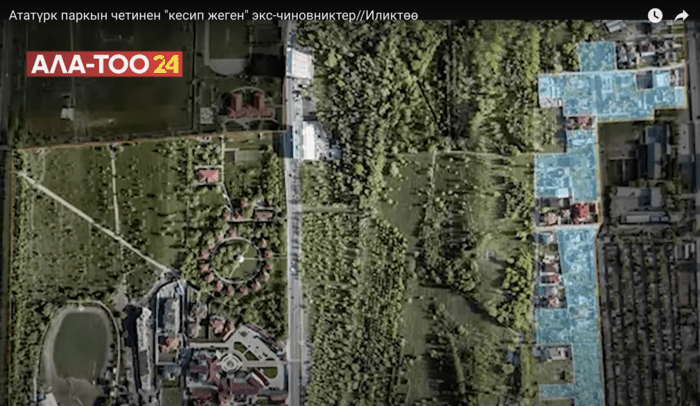The Ataturk Park affair was exposed in 2019 by OCCRP and its partner, Kloop, an investigative outlet that a Kyrgyz court recently shut down when it began probing wrongdoings of the current regime.
The purported reason for the shutdown was that Kloop was practicing journalism without a license. Prosecutors also claimed that the outlet’s stories about corruption in the country were “upsetting” the public.
However, this did not prevent a state-run TV station from airing Kloop’s investigation as its own just three days ago.
For nearly 14 minutes, a reporter for the TV channel Ala-Too 24 passionately discussed the individuals who illegally acquired the land plots in a report titled “Ex-officials who ‘cut and ate’ Ataturk Park,” complete with detailed illustrations and maps taken from Kloop’s and OCCRP’s websites.
During the broadcast, Ala-Too 24 never mentioned Kloop, although it did acknowledge below its video on YouTube that the report was based on Kloop’s and OCCRP’s investigation.
Kyrgyz journalists criticized the channel for “stealing” Kloop’s findings and using them to target those associated with the previous regime, while shutting down the investigative outlet now that it is investigating the current government.
“In this case, will Kloop not be labeled as a western, corrupt, internal enemy, or spy?” wrote Asel Sooronbaeva, editor-in-chief of the fact-checking and investigative outlet Checkit, on her Facebook page, referring to the terms used by government media when discussing Kloop just weeks ago.
“If you steal a year's worth of work from your colleagues, can you call it your investigation?” she asked.
Another investigative journalist, Elvira Sultanmurat kyzy, echoed her colleague’s sentiments.
“This is called stealing someone else’s work,” she wrote. “While authorities are trying to close Kloop, the Bishkek mayor's office claims it will return the illegally sold lands of Ataturk Park, based on Kloop's investigation.”
Bishkek Mayor Aibek Dzhunuzhaliev signed two weeks ago a decree ordering the plots to be returned to the park, the buildings on them to be demolished, and the perpetrators to be punished, according to his press office. The Mayor clarified during a press conference that the decision was made in agreement with the country’s leadership.
President Sadyr Japarov visited the Botanical Garden of Bishkek a few days ago, where he stated that over the past 15 years, the capital has lost its status as a green city due to parks being plundered, their plots sold, and transferred into private hands.
“The head of state announced his intention to restore Bishkek to its former glory as a garden city and expressed confidence that citizens, especially residents of the capital, will support these efforts,” stated Japarov’s press office.
This is not the first instance OCCRP and Kloop’s work was used to drown members of the previous regime.
At the end of 2019 several media, including Kloop and OCCRP, published another investigation, revealing how the former deputy head of the Customs Service, Rayimbek Matraimov, used his political connections to help funnel an estimated US$700 million out of Kyrgyzstan to a dozen countries around the world.
Reporters described Matraimov at the time as “untouchable.”
The revelations prompted mass protests called ReAction, with participants demanding Matraimov’s arrest. State media at the time reported on the protests but not on their cause.
Ala-Too 24 mentioned the demonstration in its evening digest but only noted that, despite a court ban, the protests were held by students of an American university. It is unclear how the channel’s journalists arrived at such conclusions.
However, as soon as the regime changed in 2020, state media began describing how powerful and corrupt Matraimov was, even mentioning findings from Kloop’s investigation.
Matraimov eventually ended up in the hands of prosecutors, mainly thanks to Kloop’s revelations, while Kloop remains closed after a process that started in September last year with Japarpov’s regime objecting an investigation that exposed the possible torture of an opposition politician by state agents.

